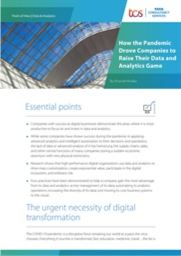How the Pandemic Drove Companies to Raise Their Data and Analytics Game
In the face of pandemic-related losses across all economic sectors, 90% of the businesses TCS surveyed have either maintained or increased their investments in their digital transformation efforts. The problem, they found, lies partly in outdated data models and insufficient and inadequate data management practices.
How critical is good data and good data management? It costs ten times as much to complete a unit of work when the data are flawed in comparison to when they are perfect. However, data has great potential for business value — and leaders are finally asking it to deliver. Companies with success as digital businesses, demonstrate the areas where it is most productive to focus on and invest in data and analytics.
In this report you will learn about:
Download now to discover how your company can gain the most advantage from its data and analytics!
Read More
By submitting this form you agree to Tata Consultancy Services contacting you with marketing-related emails or by telephone. You may unsubscribe at any time. Tata Consultancy Services web sites and communications are subject to their Privacy Notice.
By requesting this resource you agree to our terms of use. All data is protected by our Privacy Notice. If you have any further questions please email dataprotection@techpublishhub.com
Related Categories: Big Data, Cloud, Employees, ERP, Financial Services, IT Services, Manufacturing, Recruitment, Revenue, Training


More resources from Tata Consultancy Services

The New Normal that the Pandemic will Unleash...
The coronavirus pandemic has forced every large company to move knowledge work from their offices to their employees' homes. Right now, everyone is...

Why Your Agile Team is Better Off Dispersed: ...
Locating all agile team members in the same room has become a well-intended but quaint myth. Instead, companies must create location-independent ag...

Parivartana - The Role of Data and Analytics ...
From personalized healthcare to digital farming, and from energy management to digital governance solutions, Business 4.0 technologies have transfo...

